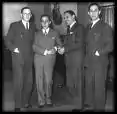Fancisco de Caro | |
|---|---|
 Julio Rosenberg, Julio De Caro, Luis Díaz, and Francisco de Caro | |
| Background information | |
| Born | 23 March 1898 Buenos Aires, Argentina |
| Died | 31 July 1976 (aged 78) Buenos Aires, Argentina |
| Genres | Tango |
| Occupation(s) | Pianist Composer Arranger |
| Instrument(s) | Piano |
Francisco de Caro (Spanish pronunciation: [fɾanˈsisko ðe ˈkaɾo], 23 March 1898 – 31 July 1976), was an Argentinian pianist and composer.[1] He is considered the most important representative of the tango romanza genre. He also performed in concert with his brothers Julio and Emilio de Caro in the Julio De Caro Orchestra.[2][3]
Works
- Flores negras.
- Luciérnaga.
- Mala pinta.
- Loca bohemia.
- Triste.
- Páginas muertas.
- Sueño azul.
- Dos lunares.
- Un poema.
- Bibelot.
- El bajel.
- Pura labia.
- Colombina.
- Por un beso.
- Poema de amor
- Aquel amor.
- Don Antonio.
- Mala pata.
- Adiós tristeza.
- Mi diosa.
- Luz divina.
- Mi encanto
- Pura labia
- Don Antonio
- A palada
- Era buena la paisana
- Percanta arrepentida
- Bizcochito
- Gringuita
- La cañada
References
- ↑ Link, Kacey; Wendland, Kristin (2016). Tracing Tangueros: Argentine Tango Instrumental Music. Oxford University Press. pp. 46–50. ISBN 978-0-19-934822-0.
- ↑ Thompson, Robert Farris (2006-12-05). Tango: The Art History of Love. Knopf Doubleday Publishing Group. p. 164. ISBN 978-1-4000-9579-7.
- ↑ Finkielman, Jorge (2014-06-24). The Film Industry in Argentina: An Illustrated Cultural History. McFarland. pp. 92–94. ISBN 978-0-7864-8344-0.
External links
This article is issued from Wikipedia. The text is licensed under Creative Commons - Attribution - Sharealike. Additional terms may apply for the media files.